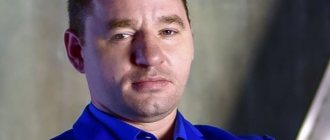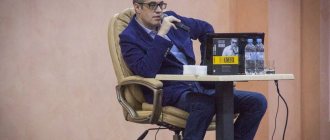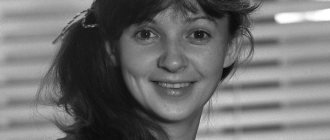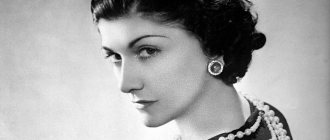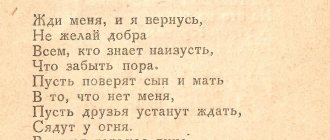Becoming
He was born in the small village of Dubovaya in Polesie near Kiev.
Date of birth: March 1, 1938. Like many children born in early spring, the boy was weak and skinny. A child caught whooping cough in early childhood might not survive it at all. A herbalist-healer attended to the baby; she managed to put the boy on his feet, contrary to the forecasts of official medicine, which had abandoned him. Borislav was brought up in a mixed Russian-Polish family, and throughout his life he retained a noticeable accent, a “talk” that often annoyed directors. In many films, Brondukov’s characters were re-voiced to remove this “defect”, and they speak from the screen in the voices of other actors.
He was baptized into a religious family of the Roman Catholic faith (in baptism Boleslav), received an upbringing that was not typical for Soviet times, and attended a parochial school at primary school age. Then he studied in the senior classes of a comprehensive school. To receive a secondary technical education, I chose the Kiev Construction College. He worked in his specialty, reaching the level of foreman in a brigade. Everything changed when I started working in Kiev. It was here, in the factory amateur drama theater, that a sharp turn in Brondukov’s fate took place. He makes a firm decision to enter the theater institute.
Movie Alvin and the Chipmunks
The tree that housed the chipmunks Alvin, Simon and Theodore has been cut down and is now heading to Los Angeles. After JETT Records buys him as their Christmas tree, the Chipmunks meet composer Dave Saville, whose latest song was rejected by company director Ian Hawke, his former neighbor and best friend, who argues that there is no point in writing songs that no one won't sing. Dave also once dated his neighbor, Claire Wilson, but that relationship is in the past.
While trying to escape the studio building, the chipmunks jump into a basket of cupcakes, which Dave steals from one of Ian's employees. So they end up at his house. There, Dave discovers the chipmunks and kicks them out, but then hears them singing. After this, he decides to make a deal with the chipmunks: they will sing his songs, and he will provide them with food and shelter. Unfortunately, Dave is unable to sell the idea to Ian, as it turns out that the chipmunks have stage fright. The day continues to go from bad to worse as the chipmunks ruin his presentation, causing Dave to lose his job. Then, when Dave arranges a date with Claire, she again rejects him when the hero has to tell the girl about the chipmunks. As an apology to Dave, the Chipmunks go to Ian to make a deal for him.
As soon as the chipmunks perform Dave's song for Ian, he enters into a contract with them. The Chipmunks soon begin to enjoy international success. When Dave expresses concern for their well-being, insisting that Alvin and the Chipmunks are like his children, Ian convinces the Chipmunks that Dave is holding them back. Soon the chipmunks decide that they should move in with Ian. At first they are fascinated by him, but Ian soon begins to exploit their naivety, forcing them to overwork, while constantly changing their image.
Dave misses his little friends at this time and wants them to come back. He calls Ian and asks to let him talk to the chipmunks, but he hangs up. At the same time, he tells Alvin and his friends that he himself invited Dave to come to them, but he refused. It wasn't long before the fact that the chipmunks were working overtime made the news. Upon learning of this, Dave decides to take matters into his own hands and sneak into their next concert.
On the evening before a big concert, after which Ian intends to begin a world tour, a veterinarian informs him that the chipmunks' voices have weakened due to exhaustion, and therefore they need a long rest to regain their strength. Instead of canceling the concert and refunding the tickets to the audience, Ian decides to use a soundtrack.
Dave, with the help of Claire, enters the concert at this time, but is then thrown out by security. Seeing this, the chipmunks realize that they have been deceived, and therefore stop the concert. Afterwards, Ian locks them in a cage, preparing to go on a world tour with them. Dave tries to convince him to free the chipmunks, but Ian refuses and gets into his limousine. Dave pursues them, but the chipmunks have already managed to hide in his car. Dave immediately slows down and admits that he loves them. At this time, Ian looks into the cage and sees that the chipmunks have escaped, leaving their dolls in the cage. Later in the evening, Dave and the Chipmunks invite Claire over for dinner again.
From construction to cinema
One cannot pass over in silence a well-known anecdote about an incident in the admissions committee of the Institute of Theater Arts named after. I. K. Karpenko-Kary. They didn’t want to accept Brondukov’s documents, citing the fact that with his appearance they should work as a construction foreman. However, the all-powerful Fortune intervened in a timely manner in the person of the rector of the institute, Nikolai Zadneprovsky.
It turned out that he had seen Brondukov on the amateur stage and was convinced of his extraordinary talent. With his direct instructions, the fate of the applicant, student, and then actor Brondukov begins.
Upon graduation, the actor becomes a full-time employee of the Kyiv Film Studio named after. A. Dovzhenko. During the decade, in 1965÷75,
Having a good command of the Ukrainian language, he starred in many films of the film studio, created in Russian and Ukrainian. His debut work was the film “Flower on a Stone” about everyday life of a miner.
During this period, the most successful project for the actor was his role in the film “Stone Cross”, which brought him victory in the category “Best Actor” at the All-Union Festival (Leningrad). But soon the film was “put on the shelf,” largely due to the fault of Brondukov himself. His overly truthful confession during the presentation of the award about his desire to embody on the screen the image of the leader of the proletariat V.I. Lenin from a comedic perspective almost ruined the actor’s entire creative career and became the reason for proceedings in the KGB.
Chipmunk Khan: biography of the ruler of the Kazakh Khanate
The history of the distribution of power in the Kazakh Khanate is perhaps the only example in the history of the Turkic peoples of its voluntary transfer from hand to hand.
Back in 1465, when the first proto-state of the Kazakhs arose, the Kazakh khans resolved the question of who would rule - Kerey or Zhanibek - by concluding an agreement. Kerey, as the eldest in the family, became khan.
After his death, according to tradition, the throne was taken by his son Chipmunk. This happened in 1474 (in some sources - 1480).
Despite the fact that Zhanibek was still full of strength and could have competed for power, he recognized the right to the throne of a descendant of Kerey Khan.
The far-sighted politician understood the importance of maintaining internal unity to strengthen the new state. His son Kasym later took a similar position towards Chipmunk.
Why did it happen so? What role did Chipmunk play in the formation of the Kazakh Khanate? We’ll tell you in detail why his personality is interesting.
Khan Burunduk looks pale compared to his relative Kasym and other Kazakh khans - the legendary Tauke and Abylai.
However, it was on his shoulders that the difficult task fell - to expand the borders of the Kazakh state in the 15th–16th centuries, strengthen external political ties and maintain unity in the state.
Buryndyk Khan received power not in the most favorable period for the Khanate - this was the time of gathering lands. 1480–1510 - a period of active confrontation with Muhammad Sheybani - the leader of the Uzbeks, the grandson of the founder of the Uzbek Ulus - Abulkhair Khan.
Even during the life of Zhanibek, Burunduk showed himself primarily as a khan-warrior.
Chronicles and anonymous sources of that time, cited by historians, say that this Kazakh khan was a desperately brave and valiant warrior. He fought not on a horse, but on a camel.
Chipmunk did not have the same political charisma as Zhanibek or Kasym, but thanks to courage and determination he was able to win the respect of the steppe inhabitants and establish the supremacy of the khans of the Kazakh Khanate in the steppe - on the territory of Desht-i-Kipchak.
This epoch-making event occurred thanks to two of Chipmunk's most important victories:
- After the death of Abulkhair Khan, power in the Uzbek Ulus passed to Sheikh-Haidar.
He entered into an alliance with the Nogai khan Musa Murza and opposed the Kazakh khans.
Zhanibek lured another authoritative Nogai ruler, Biy Abbas, to his side.
A fierce war broke out in the steppe, which, thanks to Chipmunk, ended with the victory of the Kazakh Khanate: the Uzbeks were defeated and Sheikh-Haidar died.
- After a while, Chipmunk had to oppose the Uzbek khan Muhammad Sheybani, whom the Nogai biys recognized as the khan of Desht-i-Kipchak.
This was a challenge for the Kazakh khans. Chipmunk gathered 50 thousand warriors and invaded the Nogai Horde.
He did not win, but the Nogais refused to support Muhammad Sheibani. His power has weakened. Chipmunk conquered the following cities: Suzak, Sygnak, Sauran.
Supporting genius
The image of the “little man,” funny, clumsy, touching in its sincerity, becomes a godsend for Brondukov. Rather, not heroes, but characters in which he is always recognizable and increasingly loved by the viewer, increasingly appear on the screen. Brondukov also played several leading roles, among which the most notable work was in the melodrama “Citizen Nikanorova is Waiting for You.”
And yet, his main success comes from supporting roles and episodes. Giving the central roles to his project partners, enhancing their sound, Brondukov knew how to make his characters surprisingly natural, charming and memorable. Policeman Grishchenko, distributing moonshine to relatives for “temporary use”, an alcoholic to whom “Afonya owes a rupee”, an unlucky groom whose wedding night did not go well due to a meeting of a garage cooperative - Brondukov’s appearance in the film guaranteed that the role would be remembered and the text would be understood to popular expressions that have lived among the people for decades.
He knew how to make a small role memorable without much text. It was enough to give your hero a comic touch that would be etched in the memory - such, for example, as the stupid, limping drunkard in the film “We Are From Jazz.” It is these images that Brondukov brilliantly succeeds in, earning him the epithet of the Ukrainian Chaplin from film critics.
He received the title of People's Actor in 1988, 4 years after suffering his first stroke.
In 1994, the Alexander Dovzhenko Prize was established in Ukraine, marking the 100th anniversary of the birth of the most outstanding director in Ukrainian history. And next year Borislav Nikolaevich becomes its first laureate.
The beginning of an acting career in cinema
Our hero first appeared on the set in 1962. His debut film work was the film “Flower on a Stone” (dir. Anatoly Slesarenko and Sergei Parajanov). In this film, Borislav Brondukov got a small but memorable role. He played a young guy named Kovalev.
Three years later, after the release of the film “Flower on the Stone,” Borislav Brondukov will star in his second film. This time it will be the work of director Viktor Ivchenko “Viper”. This film gave Brondukov the role of a soldier. The film “Viper” tells the story of a young girl, Olga Zotova, a brave fighter of the cavalry squadron of the Red Army. In addition to Borislav Brondukov, the following actors took part in Viktor Ivchenko’s film work: Ninel Myshkova, Boris Zaidenberg, Ivan Mikolaichuk, Konstantin Stepankov, Elena Ponsova and others.
After the film “Viper,” our hero would star in more than thirty films over the course of ten years, including the scandalous film “The Stone Cross,” for which he received an award for best male actor. It’s interesting that the character of the Soviet artist was voiced by a completely different person.
It is noteworthy that in the end the film “Stone Cross” was banned from showing. The reason for this was the words spoken by Borislav Brondukov during a press conference dedicated to his award. When the artist was asked what role he would like to play next, he replied that with great pleasure he would transform into the leader Vladimir Lenin and play him as a comedic character. After Brondukov’s words were spoken, everyone in the hall fell silent, and a little later the Soviet actor was even summoned to the KGB to testify.
On the other side of the screen
Brondukov's first marriage turned out to be tragically unsuccessful. His chosen one suffered from a mental disorder, which became known after the wedding. The marriage broke up, leaving Brondukov with a “legacy” of long-term depression.
The second marriage in 1968 was the result of a genuine and deep feeling. Brondukov was already over thirty, his passion Ekaterina was 18. A year of persistent courtship convinced her of the seriousness of her intentions, and she accepted the offer to become the actor’s wife, which she never regretted. All the romanticism and hidden lyricism of your soul during long forced separations, care in everyday life and tender attention during your time together. Brondukov generously gave to his beloved, and she responded to him with devoted reciprocity. In this marriage, the couple raised two sons, Konstantin and Bogdan.
Main roles
The filmography of our hero includes almost 150 films. There are many films on this list where Brondukov played the main characters: Major Grebnev (“I serve on the border”), veterinarian Dezhkin (“Citizen Nikanorova is waiting for you”), Alexey Butov (“Cossack Outpost”), Inspector Lestrade (“The Adventures of Sherlock Holmes ") and etc.
The directorial work of Alexander Pavlovsky brought enormous popularity to the actor. We are talking about the adventure film “The Green Van” (1983), where Brondukov tried on the image of a rural policeman Grishchenko. Other equally popular actors also took part in the film, such as Dmitry Kharatyan, Alexander Demyanenko, Viktor Ilyichev, Boris Saburov, Yuri Dubrovin and others.
It is quite unusual and surprising that a Soviet artist could refuse the main role if he thought that his character was not bright. But Brondukov took on the episodes with great pleasure: he challenged himself to turn a five-minute appearance on camera into such an extravaganza that the audience would remember his character forever.
Long farewell
The actor suffered a second stroke in the early 90s, after which the actor was no longer able to completely return to the profession, appearing only occasionally on screen. The wife devoted herself entirely to caring for him, but the family’s financial situation was simply disastrous. A third stroke in 1998 completely left him unable to move and speak.
Only by 2004 did the Screen Actors Guild of Ukraine take steps to support the family. The story, created at the Kharkov television studio and broadcast on Ukrainian and Russian television programs, attracted attention and help from individuals. But already on March 10 of the same year, suffering that lasted for ten long years led to the death of the actor. Brondukov was buried at the Baikovo cemetery in the capital of Ukraine.
Three strokes and decline in poverty: the life drama of the actor of the film “Afonya” Borislav Brondukov
Borislav Brondukov in the film “Sportloto-82” // Photo: Legion-Media
Most directors saw Borislav Brondukov exclusively in comedic roles. The roles were entirely episodic, but the artist knew how to breathe life into the character so as to reach the viewer’s heart in a couple of minutes. All-Union popularity came to the actor after embodying the character Fedul from “Afonya”. But fame turned out to be twofold: he became a hostage to the image of an alcoholic and a scoundrel, because he looked so natural on the screen. Sentences of the same type began to pour in, similar in nature to the previous material.
The capable artist fought not only for his career, but also for his personal happiness. It was difficult for Brondukov to prove to the world that he was not a superficial actor, but it was even harder to find his other half. Few people know that Borislav Nikolaevich did not succeed on the first try. But his wife Ekaterina Petrovna many times saved the star of the episodes, who was devoured by illnesses from the inside.
The fate of the artist, who left his beloved on March 10, 2004 at the age of 66, had many trials. For memorable dates in the actor’s life, we will tell his simultaneously beautiful and tragic story.
THE ROAD TO CINEMATOGRAPHER
The first picture for Borislav Brondukov was “Flower on a Stone” // Photo: Still from the film
Borislav Brondukov did not immediately turn into an actor. Coming from a working-class family originally from the village of Dubovaya, Kyiv region, he struggled for years for his true calling. After graduating from a construction technical school, he managed to become a foreman, and then worked at. His passion for amateur performances opened Brondukov’s path to cinema: one day the rector of the Karpenko-Kary Theater Institute drew attention to his performance and invited him to apply to the university.
For the first time Brondukov realized the cruelty of life when he appeared at an educational institution. The selection committee members were adamant and rude.
“You know, with an appearance like yours, you should work as a foreman, and not apply to a theater theater,” they noted.
The actor started at the film studio named after Alexander Dovzhenko // Photo: Still from the film
If it were not for the intervention of the rector, Borislav would not have become a student at the theater university. But Nikolai Zadneprovsky was indignant at the words of his colleagues: “Why are you persecuting him? Yes, he will become a famous artist! I saw him play in the factory folk theater. Come on, take the documents from him!”
The film premiere for Brondukov was the film “Flower on the Stone,” where he played Kovalev. By the way, it was around then that he was recognized under the name “Borislav”, although initially his mother named her son Boleslav. This truly became the second birth of a former worker, the birth of an actor.
CULT HERO
Borislav Brondukov became for fans Fedul from “Athos” // Photo: Still from the film
Borislav Brondukov said that he was not very worried about the lack of major works. “To hell with them, with the main roles! You give me a good episode, and I’ll make candy out of it!” - stated the artist. So, in the 70s, he was offered to play Fedul, an alcoholic from the film “Afonya,” and Brondukov got into the character’s image so much that the public had no doubt: in reality he was just as much a scoundrel and a drunkard. The audience's opinion was wrong, but the director of the film, Georgy Danelia, specially added a couple of scenes for Borislav Nikolaevich: he liked the actor's test.
If it were not for the transfer of filming from the Kyiv studio to Mosfilm, Brondukov could have gotten the main role in the film. But everything turned out differently, and the plumber Borschov was played by Leonid Kuravlev. Nevertheless, Borislav Nikolaevich had enough love from fans. Danelia said that Fedul received the largest number of applause at meetings in cinemas.
“In costume and makeup, Borya was so organic that when, during filming in a restaurant, he went outside to smoke, the doorman never wanted to let him back in,” said Georgy Danelia.
Dmitry Kharatyan with Borislav Brondukov // Photo: Still from the film
The associations did their part: the artist was invited to audition for characters with a criminal past, drunkards and rowdies. Brondukov never had problems with alcohol, so he was sometimes offended by passers-by who compared him to Fedul. “Many were deceived by the appearance of a simpleton. And often the viewer, seeing the actor on the street, confused the screen with life, not understanding how much Borislav Nikolaevich suffered from excessive attention. After all, many treated him as a comedian and were constantly waiting for jokes and anecdotes that he would make him laugh. But he didn’t like being pestered, and sometimes he drove off annoying fans quite harshly. He stopped familiarity instantly. Borislav Nikolaevich was not a superficial artist, and behind the external comic figure one could feel a subtle, vulnerable soul, and the pain he had once endured, and a difficult fate,” said Dmitry Kharatyan, who knew Brondukov from working in the “Green Van”. And Kharatyan turned out to be right: the artist’s path could not be called easy.
UNSUCCESSFUL MARRIAGE AND MEETING WITH THE “GUARDIAN ANGEL”
Ekaterina became the love of his life for Borislav Brondukov // Photo: Social networks
It is not customary to talk much about the first wedding bells that sounded in the life of Borislav Brondukov. In the early 60s, he married a student at the Leningrad Polytechnic University. But the union did not last long; it is only known that the artist’s wife was diagnosed with a mental illness, with which it was impossible to exist in marriage. After the divorce, Borislav Nikolaevich did not think about women for several years, became sad and even started drinking.
Love unexpectedly knocked on Brondukov's door. A chance meeting with 18-year-old Ekaterina at the airport marked the beginning of a great bright feeling. Katya dreamed of entering a theater institute, and Borislav Nikolaevich volunteered to teach her the basics of acting. Thanks to the artist’s lessons, the girl entered university. But at first glance, the star of the episodes seemed impudent to her. It took the lover a whole year of courtship to win the favor of the new muse.
Catherine saved the actor from depression, and in return received boundless care and reverent attitude. They got married in 1969 and have not been separated since then. The aspiring artist made an amazing wife: she cooked, washed, cleaned tirelessly, waited for her lover from rehearsals and gave her husband two sons, Kostya and Bogdan. Despite the age difference of 13 years, amazing mutual understanding reigned in the Brondukov family. Over time, Ekaterina Petrovna admitted herself to be mediocre for the stage and completely devoted her life to home. She dreamed of a daughter.
“As soon as the second boy was born, Bronya said: “We are now safe with money. Let's have another one." But a month later Bronechka came up to me, lowered his head, and said: “Maybe, let’s not do it right away? It’s too hard,” Ekaterina Petrovna recalled in an interview.
With the role of Inspector Lestrade, Borislav Brondukov’s popularity increased // Photo: Still from the film
Brondukov was quite popular, playing an unlucky groom in Garage, Inspector Lestrade in The Adventures of Sherlock Holmes, and a fake captain in We Are From Jazz. But, as the artist’s wife noted, he received no more than others. At first, the family lived in a communal apartment, and afforded themselves a four-room apartment by exchanging government-donated housing in Bereznyaki. The main difficulties lay ahead: Borislav Nikolaevich’s health had failed, and the support of Katya, who was nicknamed his guardian angel, helped him more than ever.
THE HARDSHIP OF ILLNESS AND POVERTY
In the 90s, the actor was very ill, but did not give up his profession // Photo: Still from the film
Brondukov had his first stroke after working on Nikolai Mashchenko’s painting “The Karastoyanovs.” The couple filmed there together. Borislav Nikolaevich played the commander of a partisan detachment, who is informed that his entire family has died. “How he played a tragedy! I even forgot that this was filming and wanted to shout: “Stop it, otherwise you’ll die!” It was probably a premonition of something terrible. Filming took place in December, and in January I had an attack,” said the actor’s wife.
Several ambulances arrived at the artist’s house. After the stroke, Ekaterina Petrovna taught him to speak again and practiced stage speech. Brondukov didn’t even think about quitting his profession and soon agreed to a new episode, albeit voiced by a different actor. But the second attack was not long in coming, catching Borislav Nikolaevich rushing to filming.
“Bronechka was in a coma for three days. I spent the night with him in the hospital in the same bed. She fed him and helped him walk. And things went well - he got out. After his second stroke, his vision deteriorated. And at this time, in order to somehow support the family budget, I took up the sewing machine,” explained Ekaterina Petrovna.
The last role of Borislav Brondukov // Photo: Still from the film
This was in 1993, and only when three years later the artist was given a presidential scholarship did the family feel a little better. The actor recovered a little from his illness, but it was a time of crisis in cinema. The wife left her job to look after Brondukov, and there was almost no money left. I had to help myself to pies offered by passers-by who recognized Borislav Nikolaevich, and take a “soup set” from a familiar butcher.
The last time the artist appeared on screen was in 1997 in the film “Hippiniada, or the Continent of Love.” Soon he suffered another stroke. This time, the actor was no longer able to regain his strength, did not speak and almost did not move, but his wife claimed that she read everything in her lover’s eyes. Ekaterina Petrovna did not leave her husband until the very end; thanks to her care, he lived for another seven years. Due to the high temperature, Brondukov’s blood circulation was impaired, and he died in the arms of his life partner on March 10, 2004.
Ekaterina Brondukova holds on thanks to her children, grandchildren and memories. Four years after the death of her husband, she published a book with his declarations of love. Having acted in 115 films, Borislav Nikolaevich often repeated that he considered the role of the caring husband of his beloved Catherine to be his best work.
Compiled based on materials from the publication “Culturology” and “Events”.




